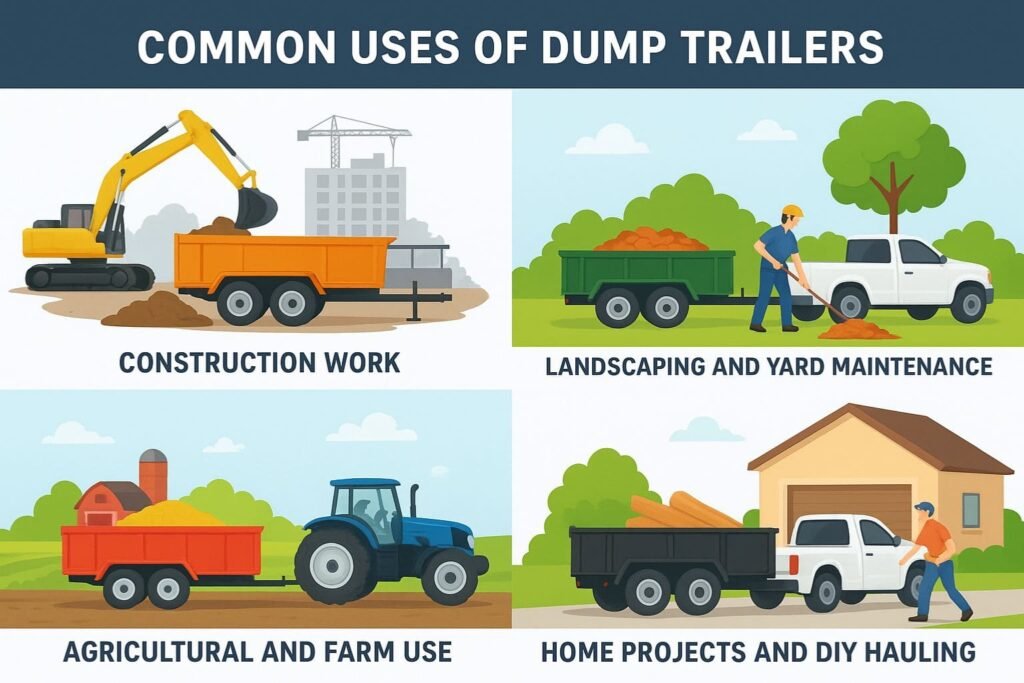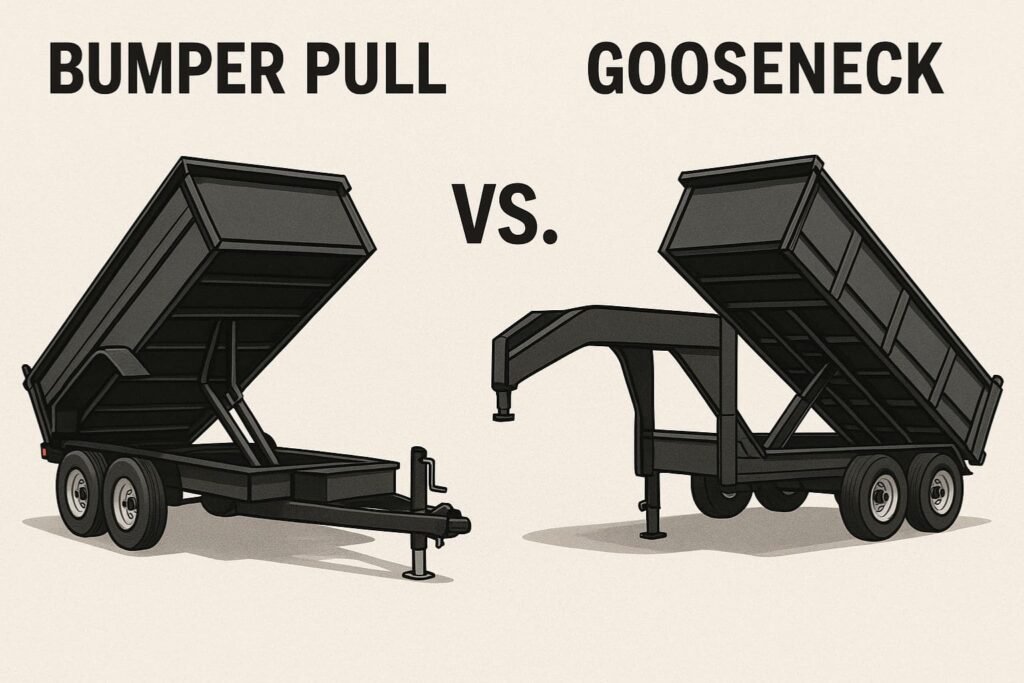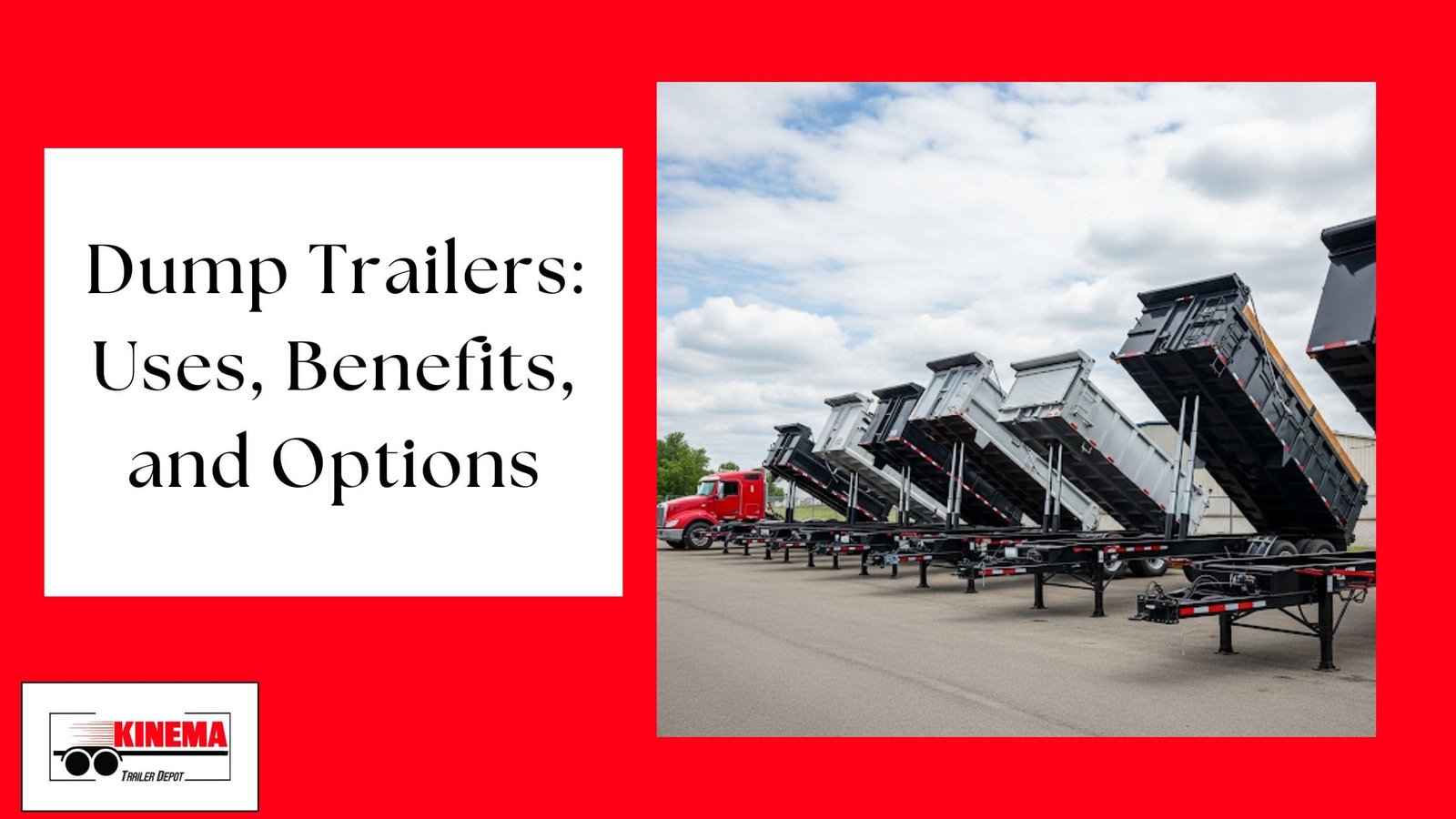In today’s fast-moving construction, landscaping, and hauling industries, efficiency and time-saving tools are essential. One of the most practical and versatile pieces of equipment you can invest in is the dump trailer. These trailers help with heavy lifting, loading, and unloading tasks, reducing the need for manual labor and speeding up job completion.
Dump trailers are widely used by contractors, farmers, landscapers, and even DIY homeowners who need a reliable way to move and dump materials. Whether it’s clearing a job site or transporting bulk materials like soil or gravel, dump trailers provide a simple, mechanical way to raise and empty the load at your desired location.They are more than just a convenient accessory—they’re a smart, cost-effective solution for anyone who regularly hauls and unloads heavy or loose material.
What Are Dump Trailers?
At their core, dump trailers are trailers equipped with a hydraulic lifting system that raises the bed of the trailer to unload the contents. They are typically towed by trucks and come in various sizes and weight capacities. What makes a dump trailer different from a standard utility trailer is its ability to tilt and release material without manual unloading.
The bed is usually made of heavy-duty steel or aluminum, and it’s designed to carry loose materials like:
- Gravel
- Dirt
- Sand
- Mulch
- Construction debris
- Tree limbs and brush
The hydraulic system—powered either electrically or hydraulically via the tow vehicle—lifts the trailer bed from one end, allowing the load to slide off the back.
Unlike a dump truck, which is costly and requires a special license to operate, dump trailers are more accessible and easier to manage. They also give you the flexibility to use your own truck as a tow vehicle, making them an attractive choice for growing businesses or personal projects.
Common Uses of Dump Trailers
Dump trailers are extremely versatile, which is why you’ll find them in use across a wide range of industries. Here are some of the most common and practical ways people use dump trailers:

1. Construction Work
Construction sites often generate large amounts of waste—broken concrete, scrap wood, metal, and other debris. Dump trailers allow builders and contractors to remove this material quickly and keep the job site clean. They also come in handy for delivering sand, gravel, or equipment directly to the work zone.
2. Landscaping and Yard Maintenance
For landscapers, moving mulch, soil, sod, and garden waste is a regular part of the job. Dump trailers make this process fast and easy. They can carry large volumes of organic material, and when it’s time to unload, the hydraulic lift takes care of the rest—no shovels or wheelbarrows needed.
3. Agricultural and Farm Use
Farmers often use dump trailers to transport animal feed, manure, hay, or harvested crops. On large farms, these trailers are an efficient way to move materials across fields without needing heavy machinery. Because many dump trailers are built to handle rough terrain, they’re ideal for off-road farm work.
4. Home Projects and DIY Hauling
Even homeowners benefit from using dump trailers. Whether you’re clearing out a garage, removing old furniture, or doing a backyard renovation, having your own dump trailer gives you freedom and saves on rental fees. You can haul materials to and from your property and dispose of waste on your schedule.
In all these scenarios, dump trailers provide real value by saving time, effort, and money. They turn labor-intensive jobs into smooth, single-person operations.
Benefits of Using Dump Trailers
There are many reasons why people choose dump trailers over other hauling options. Whether you’re a professional contractor or a homeowner managing your own projects, the benefits are practical and long-term.
1. Time and Labor Saving
One of the biggest advantages of dump trailers is how much time they save. The built-in hydraulic lift system allows you to unload materials quickly with the push of a button. There’s no need to shovel everything out by hand. This feature alone can reduce labor costs and speed up job completion.
2. Versatile Hauling
Unlike standard utility trailers, dump trailers are designed to handle a wide variety of materials. You can haul loose items like gravel, mulch, or topsoil, as well as bulky debris such as branches, lumber, or construction waste. Some models even come with side extensions, allowing you to carry more volume safely.
3. Cost-Effective Investment
While buying a dump trailer is an upfront investment, it pays off over time. Renting heavy equipment like dump trucks can be expensive, especially for long-term or recurring work. Owning a dump trailer means you can manage your own hauling needs and save on rental fees and labor.
4. Easy to Tow and Store
Most dump trailers are built to be compatible with pickup trucks or commercial vehicles. They’re compact enough to store on your property and easy to maneuver in tight areas—something larger dump trucks can’t do.
Types and Options Available
There’s no one-size-fits-all when it comes to dump trailers. Depending on your needs, there are multiple types and custom options available.
1. Bumper Pull vs. Gooseneck
Bumper pull dump trailers attach to a hitch near the rear of your vehicle. They are great for smaller loads and easier to manage in urban areas. Gooseneck dump trailers, on the other hand, attach inside a truck bed and offer better stability and higher weight capacity. They’re ideal for heavy-duty work or larger hauling projects.

2. Material Construction: Steel vs. Aluminum
Most dump trailers are made from steel, known for its strength and durability. However, aluminum models are lighter and more resistant to rust, which is helpful in wet or coastal environments. Steel trailers can carry heavier loads, but they may need more maintenance over time.
3. Hydraulic Lift Mechanisms
All dump trailers use a hydraulic system, but they differ in power and function. Some use a single ram system, while others use a scissor lift or telescopic cylinder for extra lifting force. If you’re frequently carrying heavy or uneven loads, investing in a stronger hydraulic lift is worthwhile.
4. Size and Load Capacity
Dump trailers come in various sizes, usually ranging from 5’x8’ to 7’x16’ or larger. Load capacity can vary from 3,000 to over 14,000 pounds. When choosing a trailer, consider the average weight and volume of your materials to avoid overloading.
Optional Features
Modern dump trailers offer add-ons like:
- Tarp kits
- Loading ramps
- Side extensions
- Solar battery chargers
- Wireless remote control for hydraulic lifts
Read More: Essential Guide to Types of Dump Trailers
How to Choose the Right Dump Trailer
Choosing the best dump trailer depends on your unique needs. Here are some practical steps to guide your decision:
1. Match the Trailer to Your Tow Vehicle
Before anything else, check your vehicle’s towing capacity. Buying a trailer that’s too heavy for your truck can lead to safety risks and mechanical problems. Most dump trailers list their Gross Vehicle Weight Rating (GVWR), which tells you how much weight the trailer and its load can safely handle.
2. Identify Your Typical Loads
Think about what you’ll haul most often. If you regularly move heavy materials like stone or concrete, choose a dump trailer with a higher payload and a reinforced bed. If you’re mostly carrying mulch or debris, a lighter model with taller sides might be enough.
3. Consider Terrain and Worksite Conditions
Will you be using the trailer on paved roads or rough, uneven ground? If you’re working off-road or on farms, you may need a model with rugged tires, higher clearance, and stronger axles. Some dump trailers are designed for uneven terrain and have reinforced frames for better support.
4. Check for Ease of Operation
Look for features that make your job easier. For example, trailers with wireless hydraulic controls or quick-release latches save time and effort. A dump trailer should be easy to load, tow, and empty—especially if you plan to use it often.
5. Balance Features with Budget
While it’s tempting to go for the cheapest option, think long-term. Spending a little more on a quality dump trailer with useful features can save you from expensive repairs or upgrades later.
Maintenance and Safety Tips
Owning a dump trailer is a smart investment, but like any equipment, it needs regular care to stay in good working condition. A few simple maintenance steps and safety checks can extend the trailer’s life and keep you safe on the road or job site.
1. Regular Cleaning Prevents Rust and Damage
After each use, especially when hauling soil, gravel, or corrosive material, rinse the bed of your dump trailer. Dirt and moisture can lead to rust over time. If your trailer is made of steel, this step is even more important. For aluminum models, it helps reduce staining and keeps the surface looking clean.
Also, clean the hydraulic components and connections to prevent buildup that could cause mechanical wear or failure.
2. Inspect the Hydraulic System
The hydraulic system is the heart of your dump trailer. Without it, you can’t raise or dump your load. Check for any fluid leaks, cracks in the hoses, or slow lifting motions. If the system seems underpowered or noisy, it may be time to add fluid or inspect the pump motor.
For trailers using electric hydraulic lifts, keep the battery charged and wires secure. A weak battery can lead to sluggish performance or sudden failure when lifting a heavy load.
3. Check Tires and Axles Often
Before towing, inspect the tires for wear, low pressure, or visible damage. Properly inflated tires improve fuel efficiency and help carry the trailer’s weight safely. Also, check the axles and leaf springs for signs of bending or fatigue, especially after carrying a full load.
Tire and axle failure while towing a dump trailer can be dangerous and expensive. Preventative checks are quick but essential.
4. Secure Loads and Follow Weight Limits
Overloading your dump trailer doesn’t just damage the trailer—it puts everyone on the road at risk. Check the trailer’s weight rating and make sure your vehicle can handle the total weight, including cargo.
Always use proper straps or tie-downs to secure your load. Loose debris or unbalanced materials can shift while driving, causing rollovers or tipping during dumping.
Conclusion
Dump trailers are more than just a tool—they’re a smart, long-term solution for hauling and unloading materials in nearly every industry. Whether you’re a builder, landscaper, farmer, or even a homeowner with large projects, owning a dump trailer gives you independence, flexibility, and efficiency.
From their wide range of uses to the many benefits they offer—like time savings, labor reduction, and cost control—dump trailers are a must-have for anyone handling bulk materials regularly. Their customization options, various types, and user-friendly features make them suitable for beginners and professionals alike.
Choosing the right dump trailer starts with knowing what you haul, how often you haul it, and what your tow vehicle can handle. Once you find the perfect match, it quickly becomes an essential part of your daily operations. With proper maintenance and safe handling, a high-quality dump trailer from Kinema Trailer Depot can deliver reliable performance for years to come. It’s more than just a purchase—it’s an investment in productivity, efficiency, and independence. Visit Kinema Trailer Depot today and find the trailer that works as hard as you do!
Frequently Asked Questions
1. What is a dump trailer used for?
A dump trailer is designed to haul and unload loose or bulky materials like gravel, sand, mulch, dirt, construction debris, or farm produce. It uses a hydraulic lift system to tilt the trailer bed, allowing materials to slide out quickly without manual unloading.
2. What’s the difference between a bumper pull and a gooseneck dump trailer?
A bumper pull dump trailer connects to a hitch near the rear of your vehicle and is ideal for smaller loads and tighter spaces. A gooseneck dump trailer connects inside the truck bed, offering better stability, higher weight capacity, and is better suited for heavy-duty hauling.
3. How do I choose the right dump trailer for my needs?
Start by checking your tow vehicle’s towing capacity, then consider the type and weight of materials you haul most often. Also, think about the terrain you’ll be working on and choose a trailer with the right size, hydraulic power, and features that match your workload.
4. Are dump trailers cost-effective compared to dump trucks?
Yes. Dump trailers typically cost less upfront, don’t require a special license to operate, and allow you to use your own truck for towing. They also save on rental fees and can be stored more easily than large dump trucks.
5. How do I maintain my dump trailer for long-term use?
Regularly clean the bed and hydraulic components, inspect for rust or damage, check tire pressure and axle condition, keep the hydraulic system well-maintained, and always secure loads properly to prevent damage and ensure safe towing.









Leave a Reply